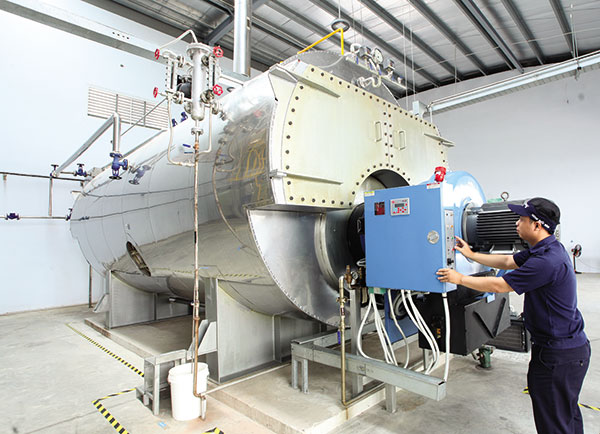JCCI opposes rules on used machinery
 |
| Circular 23 aims to tighten up the quality of used equipment and machinery to protect the environment, Photo: Le Toan |
At last week’s Vietnam Business Forum (VBF) and at a meeting between Government Office Chairman Mai Tien Dung and the Japanese Chamber of Commerce and Industry (JCCI), the chamber called the draft amendment of Circular No.23/2015/TT-BKHCN on the required quality of used machine imports “a step backwards”. It is because used machinery in investment projects no longer receive exemptions from the age requirements, as set forth in the original draft of Circular 23, which aims to encourage businesses to renovate technologies.
The chamber explained that given the overall policy of attracting foreign investment, along with the purpose of environmental protection, these new regulations are impractical in Vietnam, where there are already established standards to manage and supervise the impact of imported machinery.
There are three proposed options in the draft for requirements for used equipment in investment projects. Firstly, the age of the main part of technological lines does not exceed 20 years. Secondly, the age of the main parts of a production line does not exceed 10 years. Lastly, the quality of the main units is from up to 75 per cent.
The equipment is manufactured in accordance with either a national technical regulation, such as Vietnam Standards, or the standards of the G7 countries (a grouping consisting of the seven largest advanced economies in the world) with regard to safety, energy saving, and environmental protection.
However, JCCI complained that there may be a lack of consistency in determining which units are the ‘main parts’ of a given production chain. This designation may not be applicable to the import of a single piece of machinery, and the ability to determine the remaining age would be difficult if the criteria and standard to define such age are not clearly set out.
Regarding the third proposed option, the ability to determine the remaining value would also prove to be a burdensome process as it is dependent on the evaluation of each testing agency, and such assessment may not be consistent if the criteria and standard to define the remaining value are not transparent.
Deputy Minister of Science and Technology Pham Quy Duong responded to JCCI’s objections by saying, “We welcome ideas from business associations – in developing countries the criteria for technology are applied commonly, not for the age limit of the equipment. The purpose of this rule is to put a restraint on the importation of poor-quality secondhand machineries and equipment.”
In addition, JCCI also said that the draft’s two-stage application process is both burdensome and risky for enterprises, creating uncertainty amongst applicants.
During the initial stage of applying for an investment decision or investment registration certificate (IRCs), investors must provide a list of used equipment in order to receive age and quality exemptions. Nonetheless, the Ministry of Science and Technology (MoST) does not make final decisions at this stage, instead simply providing preliminary comments to the application.
While the draft is not entirely clear on this point, it is understood that the licensing authority only grants IRCs if the MoST’s preliminary comments are positive, which is to say that the importation of used machinery as listed in an application dossier is accepted.
The final decision is only made during the second stage, 30 days before the importation, when the investors submit a subsequent dossier to the MoST. At this stage, the ministry is still able to refuse importation.
“We propose combining the two stages into a single-stage application process, the MoST will make its final decision before or during the investment decision/IRC application process. This is critical for the investment licensing authority to approve an investment project, also for the investor to decide if it will go through with the investment or not,” JCCI stated in a document.
Echoing this view, the Vietnam Chamber of Commerce and Industry also suggested reducing the importation procedures for machinery, as well as applying quality criteria for the remaining equipment instead of simply an age limit for used machines.
What the stars mean:
★ Poor ★ ★ Promising ★★★ Good ★★★★ Very good ★★★★★ Exceptional
Latest News
More News
- Site clearance work launched for Dung Quat refinery upgrade (February 04, 2026 | 18:06)
- Masan High-Tech Materials reports profit: a view from Nui Phao mine (February 04, 2026 | 16:13)
- Hermes joins Long Thanh cargo terminal development (February 04, 2026 | 15:59)
- SCG enhances production and distribution in Vietnam (February 04, 2026 | 08:00)
- UNIVACCO strengthens Asia expansion with Vietnam facility (February 03, 2026 | 08:00)
- Cai Mep Ha Port project wins approval with $1.95bn investment (February 02, 2026 | 16:17)
- Repositioning Vietnam in Asia’s manufacturing race (February 02, 2026 | 16:00)
- Manufacturing growth remains solid in early 2026 (February 02, 2026 | 15:28)
- Navigating venture capital trends across the continent (February 02, 2026 | 14:00)
- Motivations to achieve high growth (February 02, 2026 | 11:00)
















 Mobile Version
Mobile Version